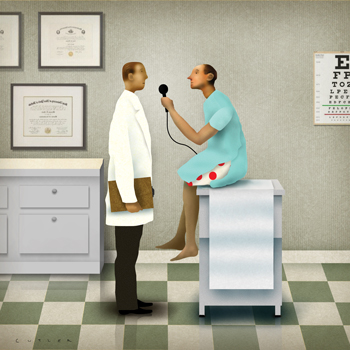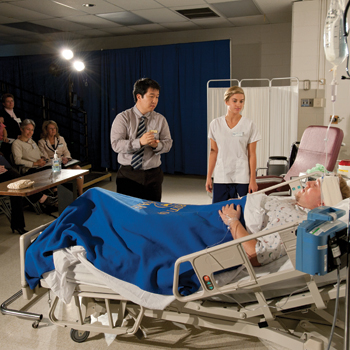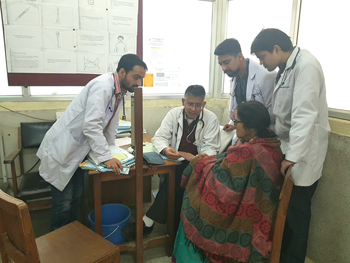It's time for doctors to say ‘never again’ to gun violence
Because the public trusts physicians on matters affecting their health, doctors can contribute so much to the fight for commonsense gun policy reforms. Learn how.
Following the February 14 mass killing of 17 students and teachers at a high school in Parkland, Fla., and the wounding of 14 more, the hashtag #NeverAgain became the social media rallying cry for teenage survivors of the shooting. Yet since then, the daily toll on people killed or injured from firearms in schools, homes, workplaces, stores, and neighborhoods has continued unabated. A nonprofit website reports that from the start of this year through March 4, there have been 9,368 incidents of gun violence in the United States, resulting in 2,490 deaths (not including suicides by gun) and 4,250 injuries. Included in the killed or injured were 102 children aged 11 or under, 474 teenagers, and 54 police officers. With suicides by gunshot included, 38,000 Americans are likely to die from guns by the end of this year, with another 81,000 suffering nonfatal (but often devastating) gun injuries.
We have such a long, long way to go before #NeverAgain.
Yet by turning their heartbreak into heartfelt advocacy, the Parkland students have inspired a movement that makes me more hopeful than ever that debate over gun policy has fundamentally shifted toward tightening restrictions on firearms. A CNN poll taken shortly after Parkland found that 7 out of 10 Americans favor tighter gun laws, the highest since 1993, with “intensity” being on the side of those favoring tighter laws. “A majority, or 52%, say they ‘strongly’ favor stricter gun laws, well above the previous high mark of 37% in polling back to 2013. Strong support outpaces strong opposition by a nearly four-to-one margin, a massive increase compared with the 36% who were strongly in favor of such a move and 27% who strongly opposed the idea in the October [2017 CNN] survey,” a Feb. 25 article on CNN.com reported. “Overall support for stricter laws includes a majority of those who live in gun-owning households (57%) as well as majorities across gender, race and age categories. Nearly all Democrats (93%) back stricter laws, as do a majority of independents (64%) and a plurality of Republicans (49% vs. 46% who oppose them).”
This does not mean that elected lawmakers, many of whom have long been supported by the gun lobby, will suddenly see the light and enact commonsense limits on guns. The U.S. Congress seems unlikely to do more than pass a bipartisan bill to provide more funding to states to improve their reporting of criminal records in the existing background check system, and even that is questionable, with some conservatives opposing the measure because of concerns over what they view as insufficient due process, and many Democrats withholding support unless more comprehensive measures are added. President Trump has been all over the place on the issue, expressing support in a televised meeting with lawmakers from both parties for raising the age for gun sales and closing loopholes in the background check system, and even for a constitutionally suspect idea to confiscate guns without due process from those at risk of harming themselves or others. Within days, though, his administration “walked back” his support for such gun restrictions.
Yet there comes a point in history when the politics change and the seemingly impossible becomes possible, often following movements spearheaded by the young. (Think of 25-year-old John Lewis, now a senior U.S. congressman, marching across the Edmund Pettus Bridge in Selma, Ala., some 51 years ago, and the progress he has seen since then.) This may be the case with gun policy, or it may not. It will be up to those who believe in reasonable restrictions on firearms to do the hard work of creating coalitions, educating the public, converting others to their cause, raising money, showing up in town hall meetings, demanding accountability from lawmakers, and electing candidates pledged to enacting gun safety measures.
Because the public trusts physicians on matters affecting their health, doctors can contribute so much to the fight for commonsense gun policy reforms. Here's how:
- Support the advocacy efforts of your professional association, especially the American College of Physicians. For more than two decades, ACP has been a strong advocate for commonsense policies to reduce gun violence, including closing loopholes in background checks, banning assault weapons and high-capacity magazines, lifting restrictions on gun research, and requiring waiting periods before purchases. In the past six months alone, following the mass shootings in Las Vegas and Florida, the College has issued statements and written to members of Congress calling for action, joined in numerous coalition statements and activities, and asked the 15,000-plus members of its grassroots Advocates for Internal Medicine Network to call their senators and representatives to support bills consistent with our recommendations.
- Take the online pledge that “When risk factors for harm to my patients or others are present, I will ask my patients about firearm ownership and safety,” an effort spearheaded by the editors of Annals of Internal Medicine.
- Become more informed about gun violence so you can speak more effectively about it. Again, the editors of Annals of Internal Medicine have done an incredible job in making all of the journal's published research and commentary on firearms injuries and deaths available free of charge to physicians and the public.
- Share your understanding and experience in letters and op-eds to your local newspapers. One of the most effective articles I have seen, published on TheAtlantic.com on Feb. 22, was written by Heather Sher, MD, a radiologist who treated the Parkland victims, describing the “devastatingly lethal” damage that is done to those shot by an AR-15 assault rifle. But physicians don't have to have had the experience of treating victims from mass shootings to speak credibly on the association between weak gun laws and injuries and deaths.
Most important, doctors must commit to doing their part to create a day when “never again” is more than an aspirational social media hashtag inspired by young survivors, but a description of how far the country has gone to eliminate mass shootings and other preventable forms of gun violence.





